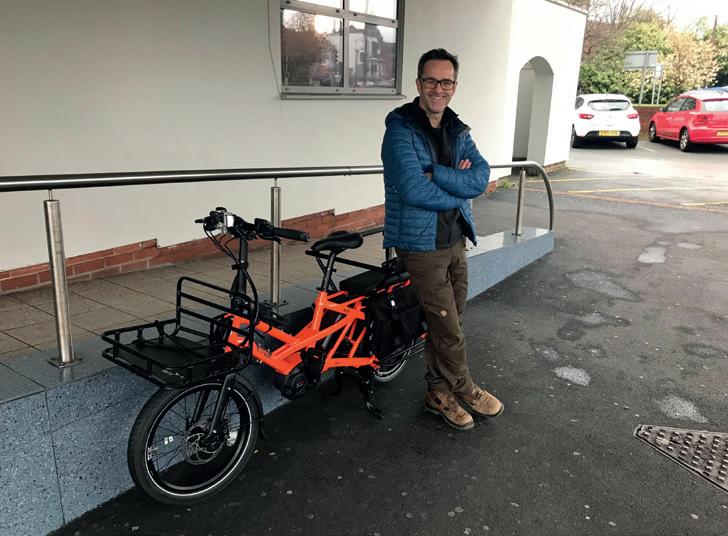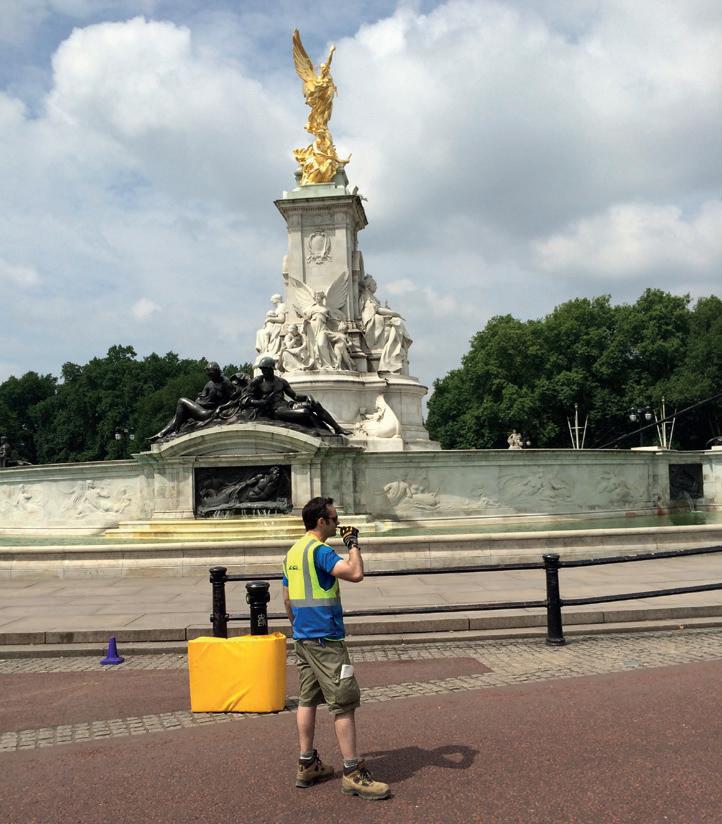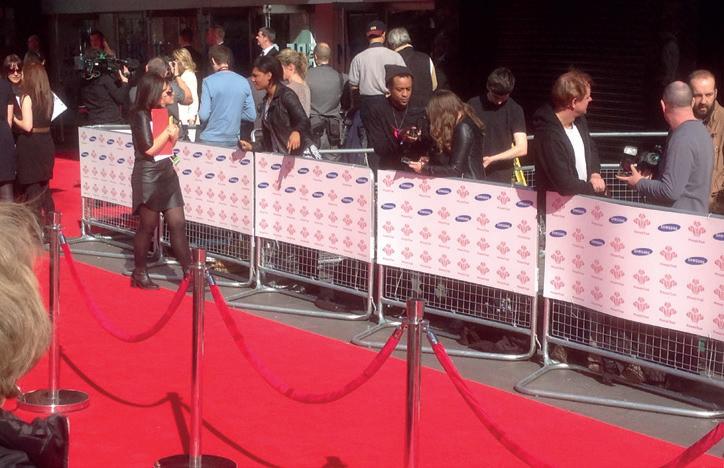
9 minute read
A FREELANCER’S LIFE
Life on the road ’m writing this on an April morning at a sunny table listening to BBC Radio 6 Music, a definite perk and constant I companion to my freelance work life. I am Make time for people, be helpful, and try not to take on too much. absolutely knackered (and housecat number Charlie Mussett, director of CHJM Events, is a freelance event one has decided to sit on the keyboard). I’m operations and safety consultant. He discusses his recent foray into back home after working with the great team event freelancing and the lessons he has learned at Human Race on the Manchester Marathon. I talk to a fair number of students via guest CHARLIE MUSSETT lectures, and do my best to point out that it’s not all hotel bars and golf buggies in fields: We all see the positive social posts after a gig, but less time is spent talking about how tired we are, the washing pile, the nagging emails from the next project, the lack of time to get a haircut and – most importantly – the people we are away from whilst working on the great event we’re now shouting about. That for me was one of the big drivers to go freelance. The rest was chance and the small matter of a global pandemic.

ON THE ROAD AGAIN
I’ve worked in events for nearly 30 years, but the vast majority have been as an employee. I started out on the Tall Ships Race with a small consultancy looking after the festival sites and public ops side of things when it visited Newcastle, Edinburgh, and Aberdeen in the 1990s, then I moved to The Great Run Company to look after mass televised events, including the Great North Run. I’ve been extremely fortunate to have worked with
some excellent freelancers over the years in so many places, and I always knew it was something I wanted to do.
I guess everyone needs a push. Mine came courtesy of COVID. I was put up for redundancy and decided to take the plunge. Furlough felt like a long slow walk to my job going, so I spent time talking to people, making new contacts and looking for that opportunity. That came in the shape of TV safety. Screen production came back sooner than events, so I took the sideways step over there, working with First Option as an associate consultant. I’d worked in event production safety, with a lot of sport outside broadcasts and been on many tech recces. Once I’d been through First Option’s IOSH TV Production Safety course and got my head around the many, many role titles in TV, it all came together well. It also felt great to be back in a car, part of a team, and out on the road during lockdown.
WHAT DO YOU WANT TO BE?
My working life now is event safety and event operations with a bit of TV safety and guest lecturing to fill in the gaps. After a long time finessing the same events, what I really craved was variety. Most of my work comes not from people I knew before but those I’ve come across, met on LinkedIn, talked to in person or been introduced to since I went freelance in October 2020.
Guest lecturing fits in nicely around the event season but is a lot tougher to deliver online under COVID than in person (online lectures eat up slides at an alarming rate) and I do hope that chances for face to face teaching continue. Events provide regular learning for all of us, handy anecdotes, and case studies, and I’m happy to be open about the good and the bad when talking to students. Everyone wants to be the person at the side of the Pyramid stage getting bands on and off, but so does the person who is doing that now – so what are you going to be? The events industry is incredibly varied. Find what you like working on, drop the things you don’t (after the gig, never quit if you’ve said you’ll be there), and don’t worry about racking up a CV full of big names. One of the most enjoyable things I’ve worked on was a brand activation last summer where we took a learn to ride cycling show to ten venues, seven days a week, over seven weeks. Low numbers, plenty of logistics, and lots of happy faces.
DETAILED INFORMATION
This weekend, working for Human Race, was the culmination of four months of planning to sort out the movement of tens of thousands of bottles of water, hundreds of loos, dozens of performers, and it all came together on the streets of Greater Manchester in a few hours. No fenced off site or long build on this one.
Briefings – online and in person – and detailed but easy to read info for crew are key. The last job before heading

to the event was to pick up the Course Handbook from my printer, a 60-page bound booklet of timings and maps for our managers covering closures, crossing points, water stations, welfare and more. On an event like that zone managers are remote. There is no handy production office to nip back to. So, if you can’t carry it on a bike, you don’t take it. My hired Tern GSD electric cargo bike was my best friend for the weekend.
HAPPY PLACE
Last weekend, I was side of stage watching aerial circus acts after a night-time build in the heart of a city centre. That gig came about via my friends at Engine No 4 (I work as event control manager for them at Parklife) who put me forward for it. To me, the key to staying successful as a freelancer is to make sure that I’m of real worth to my clients, and that the work I do is of real worth to me – in terms of both income and time impact. It sounds simple, but I just try to be helpful. Find time for people, find out what they really want, give that to them, focus on the outputs, and try not to take on too much.
I started off this year with about 20 per cent of my year in place. By week three of January, it was 80 per cent there, and whilst I may take on some more later this year I’ve got enough in there now and am talking to people about 2023. I’m learning to embrace the financial uncertainty. The variety, time at home (I’ve chosen to work fewer weekends than I used to as right now my son wants to spend time with me) and being my own boss make up for no sick pay and employer-funded pension. The attic office, my car boot as event store, and my laptop are the workplace, and I’m happier than I’ve ever been.
ENTERTEE

CAPITAL BARRIERS AND TEMPORARY FENCING

Ringfence your kit
Fencing and barrier experts discuss the upcoming event season, best practice, and trends
The events industry is busy and there is anticipation and trepidation as the summer season fast approaches. However, there is also a myriad of new challenges for 2022, and it is something that event suppliers, including fencing and barrier specialists, are all too aware of.
Liz Gillies, client services and marketing manager at Entertee, which is providing fencing to Download, Boomtown and Creamfields this summer, is excited for 2022, especially because the industry has suffered a difficult two years.
According to Gillies, team Entertee is receiving lots of calls about products that it does not supply, as organisers look for suggestions. It’s a trend that she is witnessing, and it is a concern. But it’s not her only one.
“What do I think will be a challenge this year?” she said. “Transport shortages and the increased costs of fuel to get kit to site. We engaged early with our hauliers to negotiate rates for 2022 before we started to quote clients. We do not mark-up our transport rates so after conversations with our hauliers, who are potentially imposing a fuel surcharge, we are now having to have more discussions with clients.”
Gillies empathises with organisers, as she respects budgets have been set. However, she also argues that hauliers and suppliers cannot suffer the increase. She says that there is a shortage of fencing and stage barrier, and whilst Entertee has marginally increased stock levels, the business remains conscious of industry challenges and wishes to be as efficient as possible with scheduling so that it can help as many organisers as possible.
Wes Pierce, managing director of Number 8 Events, agrees. His company is turning to cost saving efficiencies with clients, by ensuring that it maximises deliveries with a range of products on one truck. Speaking about the state of the marketplace, he explains: “It is shaping out to be a very busy year, which is needed after the past two years. But as the cost of living generally rises, so does the cost of everything involved in organising events.
“There are several quotes sitting out there with people saying they are proceeding but not actually paying a deposit. As we get closer to the event dates, this will obviously change but the availability of stock then fluctuates, and we get the same madness as 2021 when people were scrambling around for essential items the week before the event.”
In the last 12 months, Number 8 Events has invested heavily in stock levels to cope with demand from regular clients. For example, it has started to supply powder-coated crowd barrier in red and black for brand events that require smarter equipment. Such investment is having a positive impact on orders.
Number 8 Events is supplying fencing and barriers to Tide Festival and Greenwich and Docklands Festival 2022. Pierce adds: “We are finding more clients are asking us to provide more items directly, so they are dealing with fewer suppliers.”
Garry Wakefield, director of Capital Barriers and Temporary Fencing, concurs. He says: “We are supplying everything from barriers, picket fencing, VIP ropes and posts, and ground mats. Clients want to have a sole supplier for the large majority of outdoor infrastructure.
“After an extremely manic end to 2021, when the event sector opened, we contacted all our clients and urged them to get their booking in early. The pandemic hit many suppliers hard and the few that are left will be in great demand this year.”
Capital Barriers and Temporary Fencing will supply barriers and fencing to London Marathon Events, Bournemouth 7s Festival and Sandpolo in 2022. Wakefield concludes: “We are very nearly at capacity, and we aim to help as many of our clients to achieve their requirements but as usual everybody wants to hold an event on a bank holiday weekend.
“The only piece of advice I can give to organisers is get your orders in as early as possible and try to be as flexible with the timings of arrival of equipment and services as you can,” Wakefield urged.










